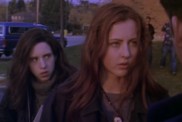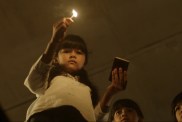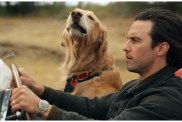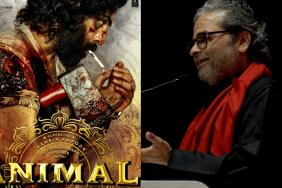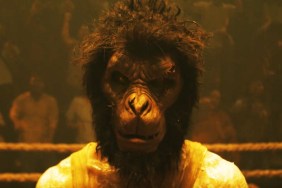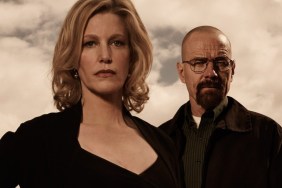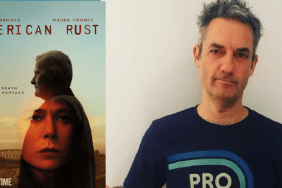Director of the upcoming sequel

When word spread that a sequel to the 2001 cult phenomena Donnie Darko was being made, fans all over the world balked at the idea. When they found out that Darko creator Richard Kelly was not going to be involved, the fans were in an uproar. Then they found out the film would focus on Donnie’s sister and Daveigh Chase (The Ring), who played Samantha in the original, would return to reprise her role as the now 18-year-old lead. The fans seemed to cool down a bit but remained suspicious. I caught up with Chris Fisher, the director of S. Darko (hitting DVD on May 12th from Fox Home Entertaiment), to get his side of the story.
ShockTillYouDrop.com: So, I have to ask, what gave you the balls to take on this project?
Chris Fisher: Good question. It’s something I reconsider all the time. You know, I don’t think it’s a question of “balls” so much as just having a deep love and profound interest in the world that was created in the first movie and really wanting to revisit that world. The project came to me as a complete script, and it was also during the writer’s strike, so there wasn’t a lot of room for developing it further once it landed in my lap. That said, the script was really interesting in that it is very true to the Darko cosmology. Nathan Atkins, the writer, really reverse-engineered the mechanics in a way that I think paid respect to the original film. But what was really interesting about it, and I think the reason to embark on a sequel, was that it was told from a female point of view. Whereas Donnie was very much a kind of graphic novel, male-driven story, I see this as a post-modern fairy tale and a much more feminine story. And as most fans know through the Darko archetypes, the original film’s point of view was told through the Living Receiver and this film’s point of view is twofold. One is living Samantha who is considered the Manipulated Living and then Manipulated Dead Samantha who is this kind of ghost that kind of travels through time throughout the movie. So it was an opportunity to take a different Darko archetype and let the story unfold through that creation.

Shock: Yeah, I have to say that I really did appreciate that switch around, I thought that was very interesting.
Fisher: Ultimately those were the two things that kind of made me think we could revisited this world in a respectful way. You know, point of view and tone are two of the most important things for a film and to look at the Darko cosmology, go into this fantastical world through this young girl’s eyes, kind of experience it in a different way, I felt justified a retooling of the story.
Shock: Now did Donnie Darko writer/director Richard Kelly have any input at all?
Fisher: I can’t speak for Richard, and wouldn’t dare to, either. I don’t know as far as the development process goes. He never spoke with me. But I think this script was finished literally like a day or days before the writer’s strike happened so at that stage anyone who was a WGA member, myself included, couldn’t work on the script. And Richard’s obviously WGA, but I don’t think he wanted to be involved and that’s something I’ve learned since finishing the film.
Shock: Was it always planned to have Samantha as the lead?
Fisher: Absolutely! Yeah, I think that was the idea conceptually even before the writer came on board. You know, I think a lot of people are fans of Daveigh Chase and I’ve actually been following her career since the original film to The Ring movies to Big Love. I think she’s perfect in Big Love and I think she’s a great young actress. When I first saw the script that was the only thing that had to happen for me to be involved with the project, for them to let me go after Daveigh. I think without her involvement the story wouldn’t have the integrity that I wanted it to have.
Shock: Yeah, I was very excited that you brought her back to reprise the role. But was she excited to come back and re-explore that character and that world?
Fisher: She was, I think she was really excited. Daveigh gives a really great, quiet, forlorn performance. I mean she doesn’t have that much dialog in the film. Her character is an observer for so much of the film. It’s a very subdued performance and she found a way to really pull that off in a kind of charming and elegant way. For all these young actors it was a big opportunity and they all had a lot of love and respect for the original film.

Shock: You mentioned before some of the archetypes of the Darko universe and casual viewers may not realize it but there is a lot that goes into the mythos of these movies. What kind of research beyond watching the original a thousand times did you do to prepare for the project?
Fisher: What we did mostly was reverse-engineer the original film and read the The Philosophy of Time Travel book. Those are the two sources that we used as the jumping-off point for our film. And everything in our movie can be explained through those two sources. As a fan of the film, I am hoping that people who see our film, maybe even see our film first and don’t understand it, will go back and watch the original film or go on-line and read The Philosophy of Time Travel. They’ll get a better understand of the cosmology and the archetypes and then watch the movie again and figure out the puzzle.
Shock: Kelly made a point to mention on his commentary track that he was very selective of his music choices for the film, often writing to the very same tracks he used. With your budget and schedule were you able to be as selective with your soundtrack?
Fisher: I actually feel I got a much better soundtrack than I had ever hoped for. I really feel the music is phenomenal. We had this great score, which I think is like this sonic landscape. It’s ethereal and haunting and beautiful. The year of our movie is 1995 and we don’t have songs from Nirvana or Smashing Pumpkins or some huge band because of budget restraints but we have music from the Cocteau Twins, music from Dead Can Dance. We have some great, great music and it’s music that helps the narrative and helps tell the story. Obviously our target audience for the movie are teenagers and I don’t think a lot of them know these bands so hopefully they’ll go back and check out this music that might be more obscure to them.

Shock: Is there a soundtrack available now or is it in the works?
Fisher: You know, right now there’s not. Mostly because I don’t think we’ve figured out how the deal is going to work. I’m not a producer on the film so I can’t really say, but what I’ve heard is that the deal hasn’t been struck yet. I think it should happen, but I don’t know if its going to happen by the time the movie is released.
Shock: Here’s a techie question. The film looks great, and I was very surprised to find out you shot it on the RED camera. What are your thoughts on it?
Fisher: I think it’s becoming much more common, even for big budget productions. The initial reason going into it was budgetary. That said, I think the image quality is something that definitely holds a candle to film. It’s really, really a beautiful camera. The director of photography (Marvin Rush) and myself were very happy with the camera and it’s definitely something the both of us would use again. And Marvin has been one of the people on the forefront of HD technology. He’s the guy that people track down when they have a new HD camera to test.
Shock: Great, well I think that’s about it. Is there any last message you want to leave with the fans of the Darko series?
Fisher: Well, hopefully we paid respect and homage in the right way to the original film and hopefully we made a movie that people enjoy watching.




Source: Jose Prendes
